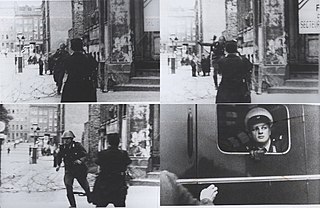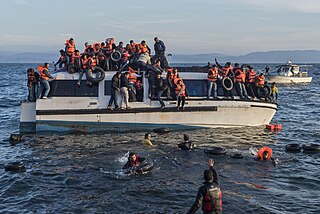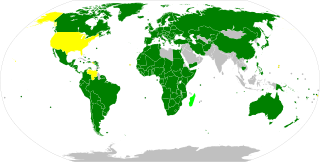Related Research Articles

The International Organization for Migration (IOM) is the principal United Nations agency working in the field of migration. The organization implements operational assistance programmes for migrants, including internally displaced persons, refugees, and migrant workers.

A refugee, conventionally speaking, is a person who has lost the protection of their country of origin and who cannot or is unwilling to return there due to well-founded fear of persecution. Such a person may be called an asylum seeker until granted refugee status by the contracting state or the United Nations High Commissioner for Refugees (UNHCR) if they formally make a claim for asylum.
An asylum seeker is a person who leaves their country of residence, enters another country and applies for asylum in that other country. An asylum seeker is an immigrant who is making a claim to have been forcibly displaced and might have fled their home country because of war or other factors harming them or their family. If their case is accepted, they become considered a refugee. The terms asylum seeker, refugee and illegal immigrant are often confused.

Forced displacement is an involuntary or coerced movement of a person or people away from their home or home region. The UNHCR defines 'forced displacement' as follows: displaced "as a result of persecution, conflict, generalized violence or human rights violations".
Refugee law is the branch of international law which deals with the rights and duties states have vis-a-vis refugees. There are differences of opinion among international law scholars as to the relationship between refugee law and international human rights law or humanitarian law.
The right of asylum is an ancient juridical concept, under which people persecuted by their own rulers might be protected by another sovereign authority, like a second country or another entity which in medieval times could offer sanctuary. This right was recognized by the Ancient Egyptians, the Greeks, and the Hebrews, from whom it was adopted into Western tradition. René Descartes fled to the Netherlands, Voltaire to England, and Thomas Hobbes to France, because each state offered protection to persecuted foreigners.

The Convention Relating to the Status of Refugees, also known as the 1951 Refugee Convention or the Geneva Convention of 28 July 1951 is a United Nations multilateral treaty that defines who a refugee is and sets out the rights of individuals who are granted asylum and the responsibilities of nations that grant asylum. The Convention also sets out which people do not qualify as refugees, such as war criminals. The Convention also provides for some visa-free travel for holders of refugee travel documents issued under the convention.
Non-refoulement is a fundamental principle of international law that forbids a country receiving asylum seekers from returning them to a country in which they would be in probable danger of persecution based on "race, religion, nationality, membership of a particular social group or political opinion". Unlike political asylum, which applies to those who can prove a well-grounded fear of persecution based on certain category of persons, non-refoulement refers to the generic repatriation of people, including refugees into war zones and other disaster locales. It is a principle of customary international law, as it applies even to states that are not parties to the 1951 Convention Relating to the Status of Refugees or its 1967 Protocol.
World Refugee Day is an international day organised every year on 20 June by the United Nations. It is designed to celebrate and honour refugees from around the world. The day was first established on 20 June 2001, in recognition of the 50th anniversary of the 1951 Convention Relating to the Status of Refugees.
Refugees in Hong Kong have formed historic waves arriving in the city due to wars in the region and Hong Kong's historical role as a trading and transit entrepôt. More recently those seeking asylum or protection based on torture claims are a fast growing part of the city's population, increasing since 2004 due to changes in the legal system for considering asylum and torture claims mandated by local courts.
Asylum shopping is a term for the practice by some asylum seekers of applying for asylum in several states or seeking to apply in a particular state after traveling through other states. It is used mostly in the context of the European Union and the Schengen Area, but has also been used by the Federal Court of Canada.
The Russian Federation's Law on Refugees defines who is a refugee for purposes of obtaining asylum in the country. The Law defines a refugee as a "person who is outside his/her country of nationality or habitual residence; has a well-founded fear of persecution because of his/her race, religion, nationality, membership in a particular social group or political opinion; and is unable or unwilling to avail himself/herself of the protection of that country, or to return there, for fear of persecution". Upon receiving an asylum seeker's application, the Russian Migration Service determines whether the asylum seeker meets the legislative definition of a "refugee" and should be granted asylum.
Sudanese refugees are persons originating from the country of Sudan, but seeking refuge outside the borders of their native country. In recent history, Sudan has been the stage for prolonged conflicts and civil wars, as well as environmental changes, namely desertification. These forces have resulted not only in violence and famine but also the forced migration of large numbers of the Sudanese population, both inside and outside the country's borders. Given the expansive geographic territory of Sudan, and the regional and ethnic tensions and conflicts, much of the forced migration in Sudan has been internal. Yet, these populations are not immune to similar issues that typically accompany refugeedom, including economic hardship and providing themselves and their families with sustenance and basic needs. With the creation of a South Sudanese state, questions surrounding southern Sudanese IDPs may become questions of South Sudanese refugees.

Zaoui v Attorney-General was the final judicial decision concerning Algerian refugee Ahmed Zaoui before the objections of the Security Intelligence Service concerning Zaoui's alleged threat to national security were withdrawn in September 2007, allowing him to remain in New Zealand. The judgment of the Supreme Court of New Zealand was concerned with the proper interpretation of article 33 of the United Nations Convention Relating to the Status of Refugees 1951 and section 72 of the Immigration Act 1987.

Voluntary return or voluntary repatriation is usually the return of an illegal immigrant or over-stayer, a rejected asylum seeker, a refugee or displaced person, or an unaccompanied minor; sometimes it is the emigration of a second-generation immigrant who makes an autonomous decision to return to their ethnic homeland when they are unable or unwilling to remain in the host country.
The Cartagena Declaration on Refugees, or just Cartagena Declaration, is a non-binding regional, i.e. Latin-American, instrument for the protection of refugees and was adopted in 1984 by delegates from 10 Latin-American countries: Belize, Colombia, Costa Rica, El Salvador, Guatemala, Honduras, Mexico, Nicaragua, Panama and Venezuela. The Declaration has since been incorporated into the national laws and state practices of 14 countries.
Impediment to expulsion, or prohibition of deportation, are practical or legal barriers that prevents a country from enforcing an expulsion or deportation decision of a non-national. In some countries and cases, a person who has been asylum seeker but has received negative decision, may still be entitled to reside in the country where the person has applied for a residence permit due to such impediments, and may get a temporary or permanent residence permit. In other countries and cases, the person would be considered an undocumented immigrant, or may be in an undefined legal state.
The migration and asylum policy of the European Union is within the area of freedom, security and justice, established to develop and harmonise principles and measures used by member countries of the European Union to regulate migration processes and to manage issues concerning asylum and refugee status in the European Union.
Pushback is a term that refers to "a set of state measures by which refugees and migrants are forced back over a border – generally immediately after they crossed it – without consideration of their individual circumstances and without any possibility to apply for asylum". Pushbacks violate the prohibition of collective expulsion of aliens in Protocol 4 of the European Convention on Human Rights and often violate the international law prohibition on non-refoulement.

The Asylum Act (AsylA) is a Swiss federal law that governs the country's procedures for granting asylum to refugees. It was adopted on 26 June 1998 by the Federal Assembly and came into force on 1 October 1999. It replaces the previous and first Asylum Act from 1981.
References
- ↑ "The 1969 OAU Convention and the continuing challenge for the African Union | Forced Migration Review". Archived from the original on 2018-08-13. Retrieved 2017-01-22.
- 1 2 3 "Archived copy" (PDF). Archived from the original (PDF) on 2017-03-29. Retrieved 2017-01-22.
{{cite web}}: CS1 maint: archived copy as title (link) - 1 2 "Ambf CMS". Archived from the original on 2019-11-21. Retrieved 2017-01-22.
- ↑ "Alternative Standards Specific to Refugees - the Regional Level — Forced Migration Online". Archived from the original on 2017-02-19. Retrieved 2017-01-22.